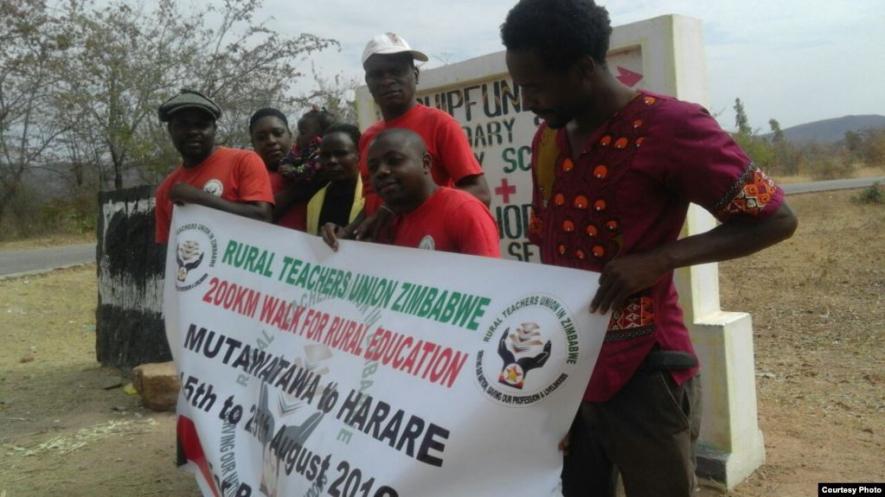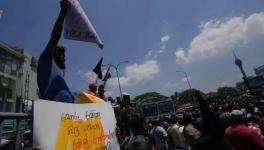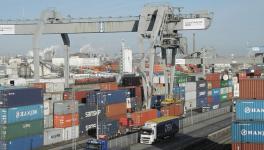Zimbabwean Teachers Begin Strike Demanding Restoration of Salary Value

Members of Amalgamated Rural Teachers Union of Zimbabwe (ARTUZ).
Primary and secondary school teachers affiliated with the Amalgamated Rural Teachers Union of Zimbabwe (ARTUZ) have begun a prolonged strike to demand the restoration of the value of their salaries. Since October, the value of their salaries has declined from USD 400 to USD 30 for the lowest paid teacher.
As a part of the strike action, the teachers have taken their holidays, that were scheduled to begin in the first week of August after the close of the second term, in advance, starting from July 22. Only 12% of the union members have remained in schools to wind up the term.
“The early holiday will enable teachers to engage in other income generating projects to cushion themselves from the economic hardships confronting us,” the ARTUZ said in a statement. “We once again implore government to restore the value of our salaries or we will not open schools for third term [scheduled to begin in the first week of September].”
While the union’s original mandate was to organize teachers in rural areas, its membership has expanded into urban areas as well. Since the beginning of this year, more and more teachers have shown interest in the ARTUZ. The union’s membership is now over 35,000.
Other unions are also likely to take part in the strike by not opening schools for the third term because most teachers are incapacitated. “It is not a matter of choice anymore. Teachers do not have enough money to afford to travel to school and back everyday. Even teachers who support the government, who would want to go to work and not take part in the strike, are not in a position to afford the costs (of traveling daily),” Obert Masaraure, the president of ARTUZ told Peoples Dispatch.
The salary of the lowest paid teacher, that was paid in USD until last October, was USD 400 a month. The government then started payment of all salaries to civil servants in RTGS. While this currency was originally said to be pegged to USD at a 1:1 ratio, its value has declined sharply over the months that followed.
Early last month, the teachers had embarked on another strike, complaining that the salary of the lowest paid of them had dropped to an equivalent of USD 80. With a further fall in the value of RTGS since then, it has now declined to an equivalent of USD 30 this month.
The teachers and other civil servants have long been agitating for the payment of their salaries in USD, because the prices of all commodities in RTGS, including basic items of food and medicine, have been rising with every fall in the value of RTGS vis-a-vis the USD.
However, in a move that shocked many agitating civil servants, the government scrapped the multi-currency system and imposed RTGS as the only legal currency. Nonetheless, the prices in RTGS continue to vary according to the inter-bank rate of RTGS to USD.
“If the prices change according to the (value of RTGS as measured in USD), then our salaries must also vary accordingly,” Masaraure said.
The government had earlier promised to give teachers a one time allowance equivalent to USD 409 in order to help cushion the burden of falling wages. However, this allowance has yet to be distributed and while this amount can barely offset the loss of wages that teachers have suffered for over half a year now, the real value of even this amount has declined since the announcement was made.
The devaluation is primarily because the fuel price has been hiked twice since the announcement was made, first from USD 5.50 to 6.50, and then to USD 7.50. By Monday, the price is set to reach USD 9.50, Masaraure said.
No faith in the Apex Council
Calling on all teachers and other civil servants to take action, the union has warned about getting distracted by the Apex Council, which is legally representing the unions in the negotiations with the government at the National Joint Negotiating Council (NJNC).
When the Apex Council was established through a statutory instrument in 1997, it was meant to represent all the unions of civil servants. At the time, however, there were only two unions. Now there are 26 unions, only nine of which are represented in the council.
The ARTUZ is not represented, and Masaraure explained that it is not seeking representation, because the body’s functioning is contrary to the labor rights established in the constitution. Zimbabwe’s constitution establishes collective bargaining as a labor right, however when the Apex Council negotiates on behalf of unions at the NJNC, a quorum can be reached without the presence of the unions’ side.
The current board of the Apex Council was not even elected. “We were only informed after the new board had been set up”, Masaraure said. He further alleged that the chairperson of this board is compromised. She has been appointed to the board of the National Social Security Authority (NSSA), where “she is earning a lot”. She cannot represent the interests of unions, he said.
“Every time unions give a call for action, the Apex Council [seeks to demobilize] by promising to negotiate and secure a wage hike which never materializes,” Masaraure said. Not willing to count on the council anymore, the ARTUZ is currently having consultations with its members across the country to mobilize for a street demonstration soon.
The risks involved in it are considerable. In order to deal with domestic unrest, the government has acquired a massive amount of arms and ammunition.
According to the Independent, “3,343 AK-47 rifles, 2,000 CZ pistols, 500 P1 pistols… 500 Mossbergs, 500 riot guns, 300 mortar tubes, 500 MAG, 300 SSG sniper rifles, 300 Dragunov, 100 RPG, 1,500 Tokarev and 22,948 AK magazines” as well as a large amount of ammunition were acquired, not by the defense ministry but by the interior ministry, which has stated that these ammunition are “critical requirements” for maintaining law and order.
During the labor unrest in January, which was triggered by the 150% hike in fuel prices, security forces killed at least 14, raped 17 and injured at least 80 people with live bullets. Over a thousand were arrested. Masaraure himself was arrested on January 18.
Union president abducted, tortured and charged with treason
A mixed force including soldiers, policemen and members of intelligence, armed with AK-47, abducted and tortured Masaraure before handing him over to the police station, where he was charged with treason. He is currently out on bail.
On June 6, when a three-day strike action by the ARTUZ had just ended, armed men with masks broke into Masaraure’s house and abducted him again at midnight. He was driven to a bush about 15 km from his house, where he was stripped naked and tortured for hours.
At around 3 am, the kidnappers abandoned him in the bush – naked, injured and with no money or phone. After walking some distance, Masaraure found a homestead where he was given clothes and money to go back home.
No police investigation is taking place to nab the kidnappers. “Instead the police are harassing me for lodging a complaint,” he said.
After the next strike action from June 18 to 21, Masaraure was arrested again, on the allegation that he had violated his bail terms. Explaining this allegation to Peoples Dispatch, Masaraure said that his bail conditions required him to report to the police station every Friday and sign in a register. On June 14, when he went to the police station, that register was not available.
On June 21, police arrested him when he went to report to the station, alleging that his lack of signature in the register implied that he had absconded in violation of the bail terms. After a hearing the next day, the court declared that he was not guilty of violating bail terms.
However, undeterred by the physical attacks and repeated harassment by police, Masaraure continues to busy himself with organizing teachers.
The Zimbabwe Congress of Trade Unions (ZCTU), which has had differences with the ARTUZ in the past, has expressed support for the strike action. “ARTUZ welcomes the support from the…ZCTU during this phase of our battle of a living wage,” the union said in a statement, adding, “This marks the beginning of an enduring alliance in the struggle for labor justice.”
This struggle is a perilous one. ZCTU leaders, who were also arrested and charged with subversion in January, received death threats earlier this month. The union’s president, Peter Mutasa, and secretary-general Japhet Moyo received an envelope on June 16 containing bullets and a letter threatening to kill them if they undertake any labor action.
“When the ‘new dispensation’ came into office, everyone thought a new era had dawned. Unfortunately, we are moving in the worst direction. During the previous Robert Mugabe regime, we do not recall bullets being sent to trade unions despite him being a brutal dictator,” the ZCTU said in a statement.
However, “we will remain firm in fighting for social, economic and political rights and no amount of intimidation will deter us. In the meantime, our mobilization against poverty will continue until the powers that be craft better economic policies which benefit Zimbabweans,” its statement concluded.
Get the latest reports & analysis with people's perspective on Protests, movements & deep analytical videos, discussions of the current affairs in your Telegram app. Subscribe to NewsClick's Telegram channel & get Real-Time updates on stories, as they get published on our website.
























